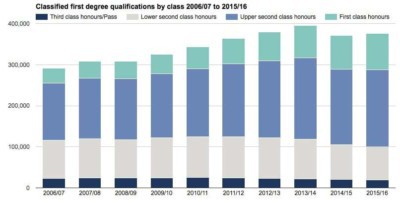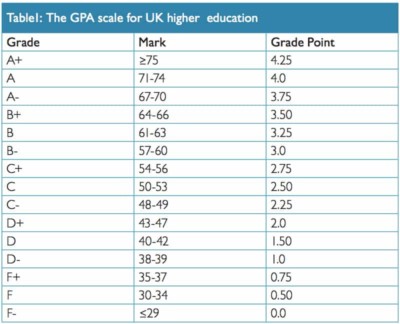‘Too many Firsts’ and accusations of grade inflation do seem to be higher education’s hardy perennial. The growth in the award of good degrees by universities, often viewed as grade inflation, is periodically in the news. It generates significant outrage generally presented as a example of declining standards. Back in July, the latest set of headlines about it signalled the opening salvo of an assault on many aspects of university life from fees to Vice-Chancellor salaries.
Many possible reasons are offered for this growth in the proportion of first and upper second class degrees including:
- the fact that students are working harder and are better supported and therefore achieve better results;
- changes in course structures over time from integrated to more modular programmes;
- the more extreme view that everything is getting easier and standards are slipping; or
- universities are intentionally manipulating results to improve their league table positions.

Whatever the reasons it is unarguably the case that with only four main categories – I, IIi, IIii and III – degree classifications are not particularly fine-grained. It is undoubtedly the case that as more and more students receive first or upper second class degrees the less useful classification is for employers in particular for differentiation between job candidates.
There are many drawbacks of traditional degree classes and as has been reported here before consideration of these issues led to some calls to investigate the Grade Point Average (GPA) model which would offer a finer grained alternative.
Six years ago a number of universities looking at introducing GPA as an alternative to traditional degree classification in order to tackle this problem. GPA, it was argued, would be:
- More transparent and better able to reflect different levels of attainment,
- Globally understood, and
- Reflective of and compatible with the culture and norms of marking in UK higher education.
Good progress was made in terms of agreeing the principles, GPA scale and marks conversion and resulted in a positive report in THE:
Seven universities are set to accelerate plans to scrap the UK’s honours degree-classification system by replacing it with the US grade-point average model.
The group, which includes six Russell Group institutions but not the universities of Oxford and Cambridge, has held a series of informal discussions on introducing GPA.
The US system is viewed as offering a more “continuous scale” that avoids the “cliff edges” between honours classifications.
At least one member of the group – UCL – could move away from first-, second- and third-class honours in just two years.
Although the development may be viewed as running contrary to the plan for the Higher Education Achievement Report (Hear) – the mooted replacement for the current classification system – those involved have stressed that GPA would “complement” the process.
but then things didn’t take off as there was not a large enough group of universities willing to take the leap.
Then the Higher Education Academy took over, aiming to build on the work which had been undertaken on the higher education achievement report (HEAR). The work was led by HEAR architect Professor Bob Burgess who reported in the Guardian that his GPA group had recommended a phased approach, starting with the achievement transcript that is the HEAR.
Burgess noted that the universities minister David Willetts was supportive of a pilot of the GPA and commented:
Around 20 universities, further education colleges and private providers are involved in this pilot to run alongside, or ultimately replace, the current classification system. I am chairing the national advisory group that is overseeing the pilot, which is being supervised by the Higher Education Academy.
Our aim is to test how a grade point average system can work in the UK. We plan to translate last summer’s degree results at the 20 pilot universities into a GPA. In addition, we would like to convert the first-year marks of the students graduating last year into a GPA score at those same institutions. This will help us to see which formula is most favoured by employers and students; what, if any, problems there are; and which GPA system would be best suited to the UK higher education landscape.

Following this pilot a comprehensive report was produced by HEA in 2015 (see this Wonkhe report on it too) which included three substantive recommendations:
- Recommendation one: a single GPA scale for UK higher education should be adopted by all UK providers.
- Recommendation two: ‘dual running’, during which both GPA and HDC outcomes will be reported, should be introduced in the first instance. This should be followed by a national review of the adoption of GPA after a period of no more than five years. Institutions may opt to switch to GPA alone when and if they judge appropriate.
- Recommendation three: degree awarding bodies will need to exercise institutional discretion on a range of regulatory and policy matters associated with their GPA award system.
The report offers a full assessment of the many benefits (as well as the drawbacks) of GPA.
So, why hasn’t it happened? We have the model, we have a some strong support from some institutions and there is undoubtedly a problem to be solved. Those institutions such as UCL which talked about going it alone appear to have shelved the idea despite the advantages. This is unfortunate.
So where do we go from here? The arguments for GPA in the context of what looks like an ever more outdated degree classification system remain very powerful. Perhaps it is time to look again at GPA.













Just finished working with a small, specialist HEI on a new assessment scheme that, in fact, has “triple-running”! Students receive an alpha-numeric grade on the new ten-band scale, that maps across to the equivalent numeric grade on the honours scale, that maps across the the ‘Burgess’ GPA scale.
Maybe I am missing something but why does anybody believe that the use of GPAs reduces “result inflation”. I believe that GPAs are universal in the USA but I see just as much discussion of the problem there.
I attended a workshop about this a couple of years ago, interesting chap called Eric Stoltz was speaking. The first thing I did once he had finished was to google grade inflation and GPA. It led me to the aptly named http://www.gradeinflation.com – which suggests it’s the era of student as customer and not the classification method that is the root cause.
I agree with others. Unsure how GPA improves academic standards or the educational benefits. Seems to be about making HE a more effective filtering system for employers.